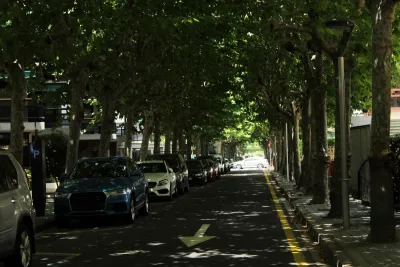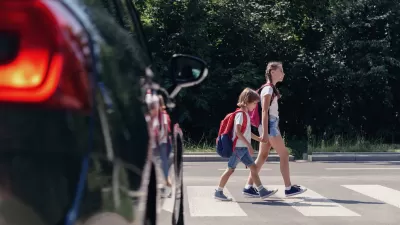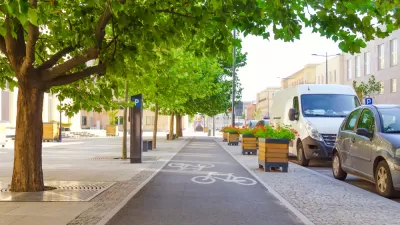Streets that offer more perceived obstacles and distractions can force drivers to slow down and drive more carefully.

New research reveals that streets that are more complex can be safer because they force drivers to slow down.
Chris McCahill explains the study results in a piece for the State Smart Transportation Initiative, noting that “When roads feel safer, drivers often compensate by speeding up and paying less attention.”
A Swiss study found that drivers slowed down when design elements such as street parking and trees were present. In a twist, the study showed that drivers actually felt safer driving faster on streets with bike lanes — potentially because they are less concerned about cyclists in their lane. Another study showed that “Drivers tended to go slower in areas with more buildings and grass medians, while speeds increased in open spaces with clear views of the sky.”
Research like this affirms the impact that the design of roadways, buildings, and street-adjacent features can have on driver behavior. “More complexity—whether through buildings, trees, or parked cars—can help keep speeds in check and streets safer for everyone.”
FULL STORY: Complex urban streets encourage safer driving

Planetizen Federal Action Tracker
A weekly monitor of how Trump’s orders and actions are impacting planners and planning in America.

Walmart Announces Nationwide EV Charging Network
The company plans to install electric car chargers at most of its stores by 2030.

San Diego Adopts First Mobility Master Plan
The plan provides a comprehensive framework for making San Diego’s transportation network more multimodal, accessible, and sustainable.

Seattle Builds Subway-Sized Tunnel — for Stormwater
The $700 million ‘stormwater subway’ is designed to handle overflows during storms, which contain toxic runoff from roadways and vehicles.

Feds Clear Homeless Encampment in Oregon Forest
The action displaced over 100 people living on national forest land near Bend, Oregon.

Is This Urbanism?
Chuck Wolfe ponders a recommended subscription list of Substack urbanists and wonders — as have others — about the utility of the "urbanist" moniker.
Urban Design for Planners 1: Software Tools
This six-course series explores essential urban design concepts using open source software and equips planners with the tools they need to participate fully in the urban design process.
Planning for Universal Design
Learn the tools for implementing Universal Design in planning regulations.
City of Moorpark
City of Tustin
Tyler Technologies
City of Camden Redevelopment Agency
City of Astoria
Transportation Research & Education Center (TREC) at Portland State University
Regional Transportation Commission of Southern Nevada
Toledo-Lucas County Plan Commissions





























